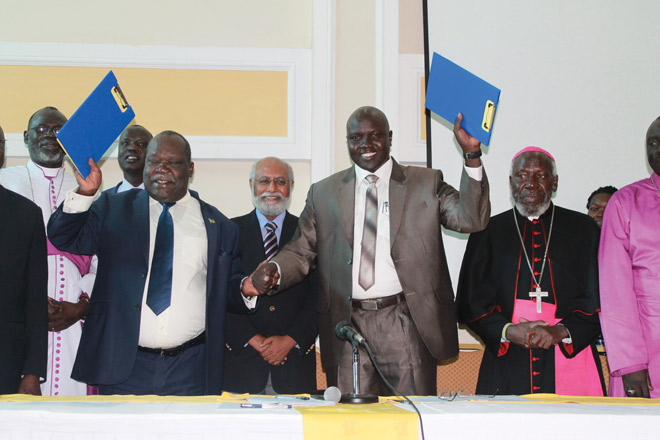
Professor Hizkias Assefa responds here to questions about his successful efforts as a mediator to bring peace in early May 2014 to a large swath of South Sudan. This is an abridged version of an interview published by EMU News Service (emu.edu/news) on June 17, 2014.
EMU: In brief, what was the result of the seven months of mediations you just finished facilitating between representatives of the Government of the Republic of South Sudan and the South Sudan Democratic Movement/Army?
Assefa: The two parties signed a comprehensive peace accord on May 9, 2014. This means that the war that has involved thousands of armed combatants and has killed and displaced hundreds of thousands of civilians over the past four years has come to an end.
EMU: But I keep reading about continued warfare, with massive numbers of displaced peoples, in South Sudan.
Assefa: There have been two wars going on simultaneously in South Sudan lately. One is the outburst of violence that started on December 15, 2013, between the followers of President Salva Kirr of South Sudan and the followers of his former vice-president, Riek Machar. The conflict started over disagreement on governance issues but degenerated into a war between the two majority ethnic groups, the Dinka and Nuer.
EMU: I believe that is the one I have been hearing about in the U.S. media. Could you say more about the other [less-known] war?
Assefa: The central Government of South Sudan has been fighting an insurgency group called the South Sudan Democratic Movement/Army. The SSDM/A fighters are based in the largest state of South Sudan, Jonglei, and are primarily composed of the Murle, Anuak and other small ethnic groups. . . Their grievances have revolved around ethnic marginalization and discrimination, as well as massive underdevelopment of their area. In other words, they have not benefited from the fruits of independence like some other major ethnic groups.
EMU: How did you come to be involved in the peace talks?
Assefa: On different occasions the insurgents, led by General David Yau Yau, called for mediation by the African Union, UN and USA. But, in the end, it was the Church Leaders Peace Initiative in South Sudan, with the support of the United Nations Mission in South Sudan (UNMISS) and a Dutch organization called Pax, that contacted me to act as mediator.
EMU: When did talks formally begin?
Assefa: Contacts with the leadership of both sides had started in October 2013 and aimed at developing trust, softening the ground, and developing a shared understanding for the mediation process. . . After very intensive negotiations, the first phase of the mediation culminated in the signature of a Cease Fire and Cessation of Hostilities Agreement on January 30, 2014.
EMU: You referred to an agreement signed on May 9. How is it different from the earlier agreement signed in January?
Assefa: Since February, I’ve been working with the negotiating teams of both parties to address the underlying political, economic, socio-cultural as well as military and security issues underlying the conflict so that the ceasefire can be transformed into durable peace. The comprehensive peace accord signed on May 9, 2014, includes . . . six provisions [aiming to remedy the root causes of the conflict].
Hizkias Assefa’s role in this peace process was highlighted by Bishop Paride Taban, chair of the Church Leaders Peace Initiative in South Sudan, in a June 2, 2014, letter to the Dutch organization that funded the mediation process. “I would also like to express my deep gratitude for the mediation services of Professor Hizkias Assefa,” wrote Taban. “It was a privilege and honor for us to work with a man of his professional caliber and personal integrity – and indeed he was instrumental in ensuring the success of these negotiations, and thus the successful conclusion to this conflict. We would not have succeeded without him.”